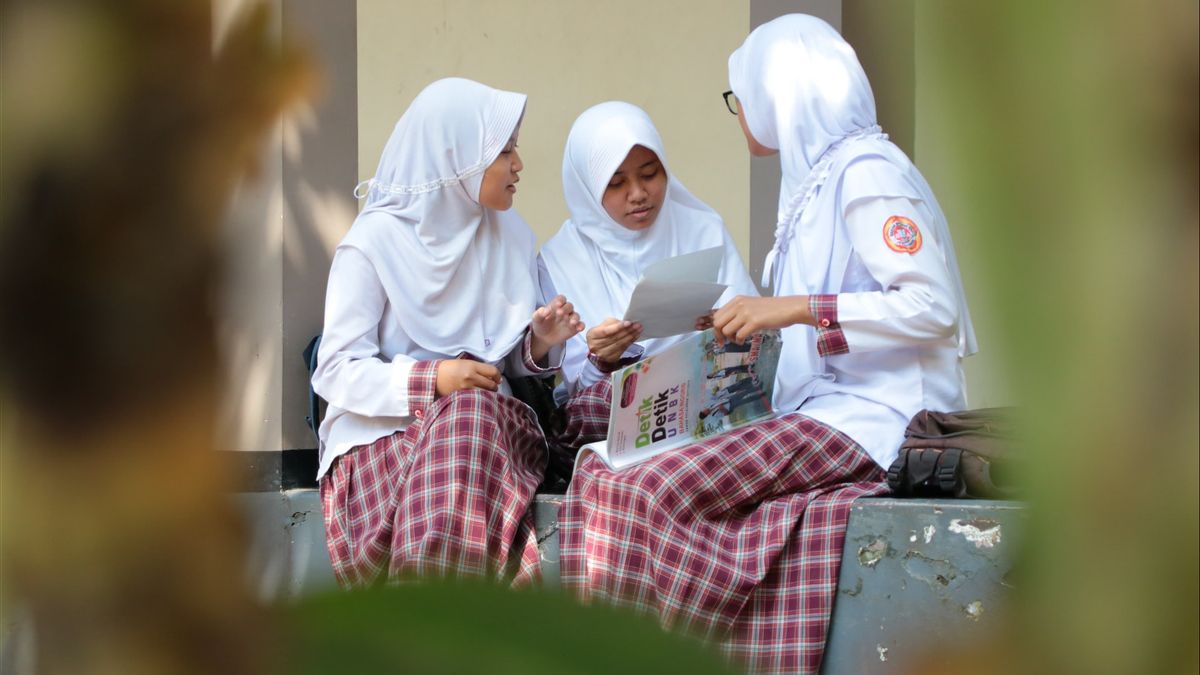JAKARTA - A survey by the UNICEF agency with Gallup in 21 countries in the first half of 2021 noted that on average, about one in five teenagers in the world experience depression or lose interest in activities. Indonesia is in the third place with the highest number of teenagers experiencing depression or as many as one in three teenagers. Indonesia is only three points adrift of Cameroon, the country where teenagers suffer the most depression.
As is well known these figures are representative of the perception of adolescents but not a diagnosis of depression according to health professionals. So what causes the mental health of teenagers to decrease?
There are several factors that hinder the protection and treatment of adolescent mental health. Some of these are systemic, such as a lack of government budget, leadership, and lack of coordination between sectors and trained workers.
According to UNICEF's annual report, our ability to cope with children's mental health is often hindered by the inconsistency of talking about it. Educators as well as parents or caregivers may struggle to stimulate children to express their feelings. However, not a few teenagers are afraid or get ridiculed and maybe even bullied due to the stigma that arises due to misconceptions about mental health.
The failure to view mental health as a positive thing often reflects the influence of biomedical thinking, where the focus is on conditions to be diagnosed and treated. "In contrast, mental health needs to be understood as a continuum or series of processes. At each stage of our lives, one of us may find ourselves at different points on that continuum," he wrote.
Everyone will feel positive mental health such as being able to enjoy life. But we may also experience periods of serious distress. "And some may suffer from long-term and disabling mental health conditions."

The COVID-19 pandemic is making the home work more than usual where digital technology plays a much more significant role for teens. For many families, they provide devices such as smartphones, tablets and laptops for their children to fulfill many needs. For example, for school purposes, communicating with friends and relatives, during the long months of implementing restrictions.
Although this is a positive aspect of technology, not a few parents, teachers, and even teenagers themselves feel the bad effects of digital technology. Especially about the impact of social media and screen time, aka time staring at the screen, which can indeed affect the mentality of teenagers.
The more children are addicted to social media, the more selfish they will be. The ability to interact with other people can also disappear.
This is because these children and adolescents have never been in contact with the surrounding community. Knowledge of the intricacies of real-life communication, such as body language and tone of voice, is also reduced.
In addition, social media can also affect the emotional development of adolescents. Because emotional development cannot be separated from its interaction with the social environment. If the social environment that surrounds adolescents is in the form of a virtual social environment, then the possibility of adolescent emotional development tends to be weak.

The UNICEF survey which states that Indonesian teenagers have lost interest in activities cannot be underestimated. Sri Mawarti in her journal published by Yogyakarta State University (UNY) said that motion is a basic need for every living being. While in adolescence, during the motor development phase, more physical movements such as sports are needed.
Middle school-aged children based on the stage of motor development have reached the transitional stage in general. According to Sri, being over 10 years old or in adolescence is a potential phase of developing neuromuscular abilities. That is why one of the interests that need to be nurtured since adolescence is the interest in sports.
"If the interest in these sports activities has been awakened in the youth, and it is as if sport has become a daily menu, then indirectly multilateral coaching has also been carried out. Sports be habitually will have a positive impact in various aspects, both internal aspects (psychomotor improvement) and cognitive) and external (socioculture)," wrote Sri.
Especially if the motor activity or sport can produce achievements. This will increase the self-confidence of teenagers. "Achievement in teenagers can be used as a proud prestige in him." So what can foster this interest?
How to cultivate interestThere are two biggest factors in how to cultivate a teenager's interest. The first is the family factor.
"The family is very decisive for the development of individuals in the future and is a place to instill the basics of personality. The family according to Hurlock (1990: 200) is the most important part of the child's network, because family members are the first environment of the child and the most important during the first year of life. -early formative years," wrote Sri.
He gave an example, if both parents or one of them likes to exercise, they hope that at least their children will also like to exercise. "This is possible because the parents have various basic considerations and conceptual aspects from various existing aspects."
In addition, family harmony also plays a role in the growth of one's interest according to Sri. "If the family is no longer harmonious, and there is no love, then all of the above will not be achieved."
Then the second factor that grows a person's interest, especially teenagers, is the environment. The environment in question is the social environment, for example, the circle of friends at school, friends at home, and other relationships.
"The environment can have a two-way function, namely as a booster for the growth and development of interest in motor activities. It is said to be a booster if in that environment many children have participated in sports training, so when playing they always tell stories about the sports they are participating in. This is indirectly also will foster youth interest," wrote Sri.
*Read other information about MENTAL or read other interesting articles from Ramdan Febrian Arifin.
Other BERNASThe English, Chinese, Japanese, Arabic, and French versions are automatically generated by the AI. So there may still be inaccuracies in translating, please always see Indonesian as our main language. (system supported by DigitalSiber.id)













